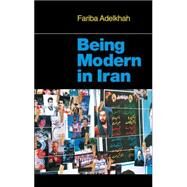Being Modern in Iran
, by Adelkhah, Fariba- ISBN: 9780231119412 | 0231119410
- Cover: Paperback
- Copyright: 5/25/2004
What does it mean to be modern in Iran today? Can one properly speak of modernity in relation to what many consider to be the paradigmatic Islamic state? Since its 1979 revolution seized the world's attention, the Islamic Republic of Iran has remained a subject of misunderstanding, passion, and polemic, making these questions difficult to answer -- or even to ask. This book -- a study of Iran's political culture in the broadest and deepest sense -- looks into both of these questions by examining the tremendous changes taking place in Iran today.Because of the difficulties posed for researchers and journalists by the nature of the regime, those interested in contemporary Iranian social life have had to rely on a small number of specialized studies -- most of which overemphasize the revolution's radical break with the past and focus exclusively on the Republic's Islamic character as the decisive factor in its social reality. But modernity has not simply been banished and excluded from Iran; nor have the effects of globalization passed it by.Drawing on her extensive ethnographic fieldwork in Iran and an encyclopedic knowledge of contemporary Iranian politics and culture, anthropologist Fariba Adelkhah investigates modernity in the Islamic Republic of Iran by looking at the growth of individualism, the bureaucracy, commercial forces, and rationalization in post-revolution Iran.Being Modern in Iranranges over such topics as taxation and Islamic legitimacy; Mayor Kharbaschi's creation of public space in Tehran; the culture of giving; religious economics; the elections of 1996 and 1997, and the popular rejoicing that greeted them; the nation-wide soccer craze; the changing role of clerics; the changing use of the Koran; and the growth of competition in all areas of life.These subjects are brought to life by vignette discussions of pigeon-fanciers, flower symbolism, funeral rites, dreams, self-help manuals, cosmetics, and much more.Adelkhah avoids a simpleminded dualism between an "odious," backward, and repressive regime on the one side and a "kindly" civil society representing progress and freedom on the other; rather, she argues that a public space is being created through the existence of many religious, political, and economic activities. This sophisticated anthropology of the Iranian state sheds much-needed light on the unique nature of the social experiment Iran has been experiencing since the revolution.







